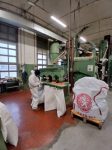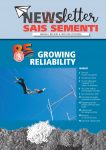MEASURES THAT GLOBAL HORTICULTURAL SEEDS PLAYERS COULD ADOPT TO TAKE BENEFIT FROM THE INFLUENCE OF GEOPOLITICS IN THE INTERNATIONAL TRADE.
Without elaborating on the politic aspects or taking someone’s side,it is widely believed that the shifts that have taken place over the past few years have influenced numerous economic sectors, including the international vegetable seed business.
These changes, often marked by trade tensions, regulatory restrictions, political instability , inflations, currency fluctuations, etc., but also by some positive aspects, are transforming the global landscape of the seed industry.
Some examples are :
– TRADE RESTRICTIONS : the imposition of restrictions on import and export can slow down the current seed distribution, causing delays and increasing costs .
– REGIONAL INSTABILITY : geopolitical , economical and logistic factors often disrupt supply chain , making access to international markets more difficult .
– REGULATORY CHANGES : the modification or introduction of new Phytosanitary or commercial regulations can affect the movement of seeds across borders .
– COMMERCIAL POLICIES : changes of commercial policies and agreements can influence the horticultural production and trade all over the world and consequently the dynamics of the seed business . These are not necessarily negative switches. For example, the increasing demand on seeds coming by countries that have decided to reduce their dependance on vegetables import or by countries that increase their export of vegetables due to the new assets . When a country or business suffers a negative influence, in most cases, another country or market simultaneously takes advantage of this.
Companies operating in the global vegetable seed market , both suppliers or importers, as well as involved in seeds production, breeding or marketing, can adopt strategies to try to mitigate the risks and take advantage of new opportunities , and implement ongoing actions , including:
– PROACTIVE GEOPOLITICAL ANALYSIS : keeping up-to-date with the political and regulatory dynamics of different areas to try to anticipate potential risks as well as opportunities. Regularly attending international events ( seed congresses , exhibitions and networking) can allow companies to remain updated and adapt their strategies.
– MARKET DIVERSIFICATION : expanding commercial activities into new countries and markets can mitigate the risks and compensate possible losses. Networking with worldwide clients, suppliers and industry experts to identify and meet their needs can be particularly effective and productive .
– COMMUNICATION AND ADVOCACY: in case of barriers or regulatory changes that negatively influence the movement of seeds, informing the seed associations or other stakeholders asking to promote favorable trade policies .
– CURRENCY RISK MANAGEMENT : adopting hedging strategies to protect commercial international transactions from exchanges rate fluctuations .
TRAINING : continuing professional development of the company’s staff to manage the current complexities of international seed trade and geopolitical challenges adopting a flexible forward – looking approach.












